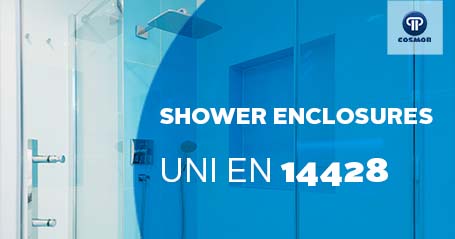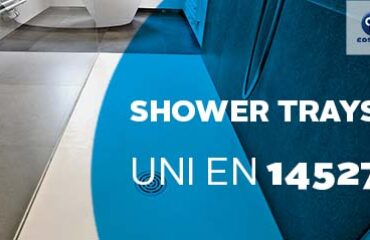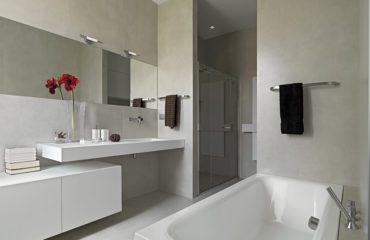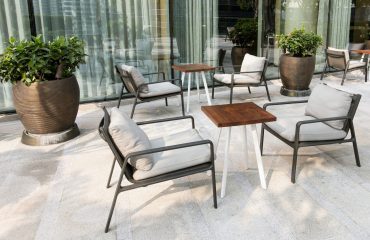The standard UNI EN 14428 “Shower enclosures – Functional requirements and test methods” specifies the characteristics of shower enclosures for domestic use so that the product guarantees satisfactory performance when installed and used correctly.
What are the requirements for “standard” shower enclosures?
Shower enclosures are panel or door arrangements (full or half height) installed around a drained shower room, shower tray or bath, in conjunction with one or more walls of the main building structure to provide a water retention area for showering purposes.
The requirements that characterise a shower tray that complies with the standard are made evident by laboratory tests and are as follows:
- Cleanability
Surfaces of shower partition components that are accessible during use and cleaning shall be free of sharp edges, corners and burrs. - Impact resistance/breakage properties
Shower enclosures may be made of transparent panels of various materials, including toughened glass, laminated glass or plastics, and shall meet the requirements for ‘safe’ fragmentation in the event of breakage. - Durability – Corrosion resistance
Shower enclosures are designed to ensure durability of performance, including corrosion resistance, which calls for different test methods to verify, for example, adhesion of paint in painted surfaces and compliance with the salt spray test. - Durability – Resistance to chemicals and staining
Following the application of specific chemical or staining agents, i.e. those present in the most common cleaning products, the surface finish of the product must not show permanent stains or deterioration. - Durability – Resistance to wet and dry cycles
Following a test in which the glazing material is immersed in hot water and then in an oven for a specified number of cycles, the glazing material should not crack, crack or discolour. - Fatigue resistance
Following the test, the shower walls shall not show any functional deterioration after opening-closing cycles. - Stability
The stability test requires that the shower walls withstand an energy representing the impact of a human body on a large impact area without any functional deterioration that could cause injury to the user. - Water retention
Under specific test conditions, the shower walls must retain water.
How can I recognise shower enclosures with CE marking?
The shower enclosure is a product subject to the mandatory CE marking, the certificate of conformity that informs the consumer that the product fully complies with the essential safety requirements and allows its free circulation within the European Economic Area.
In addition, from 1 July 2013, Regulation EC 305/2011 came into force, imposing the Obligation of a Declaration of Performance (DoP) for all construction products subject to CE marking. The “CE” symbol will only be affixed to products for which a DoP has been drawn up in which the main information relating to the product is indicated.
In the specific case of shower partitions, the following characteristics shall necessarily be disclosed:
- Number of the European standard for shower partitions for the product description;
- Cleanability;
- Impact resistance/fragmentation properties;
- Durability.
In conclusion, in order to place a shower enclosure on the market, it is necessary to carry out the tests to verify the conformity with the reference harmonised standard in order to ascertain the compliance with the essential requirements established by the EC Regulation.
COSMOB, through our Test Laboratory Division, is able to provide technical support in the verification of product conformity through laboratory tests and in the drafting of the Declaration of Performance.
For more information:
Dr. Ainara Melus Regidor
Chemical Department Technician – Quality Test Laboratory
a.melus@cosmob.it







